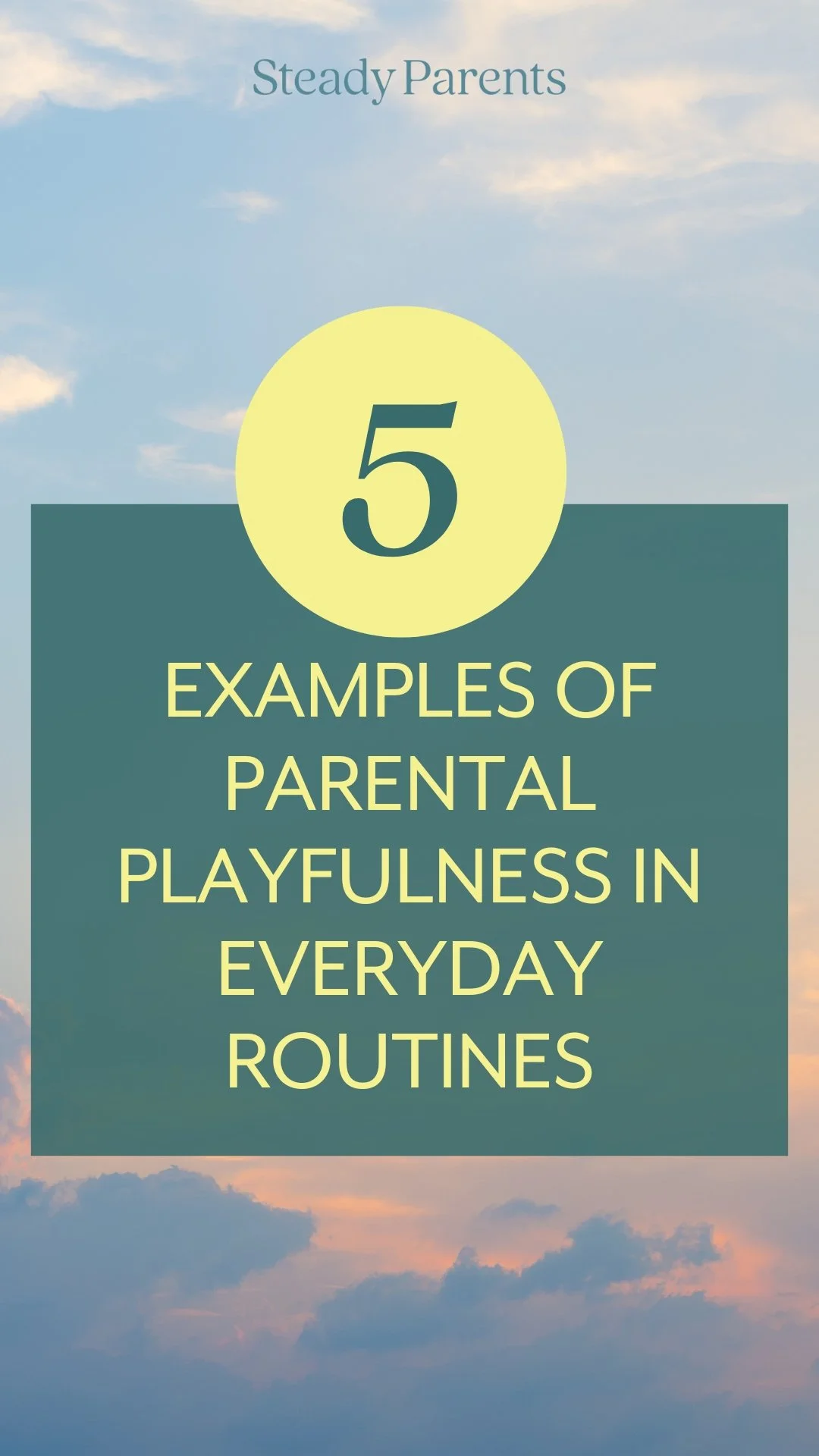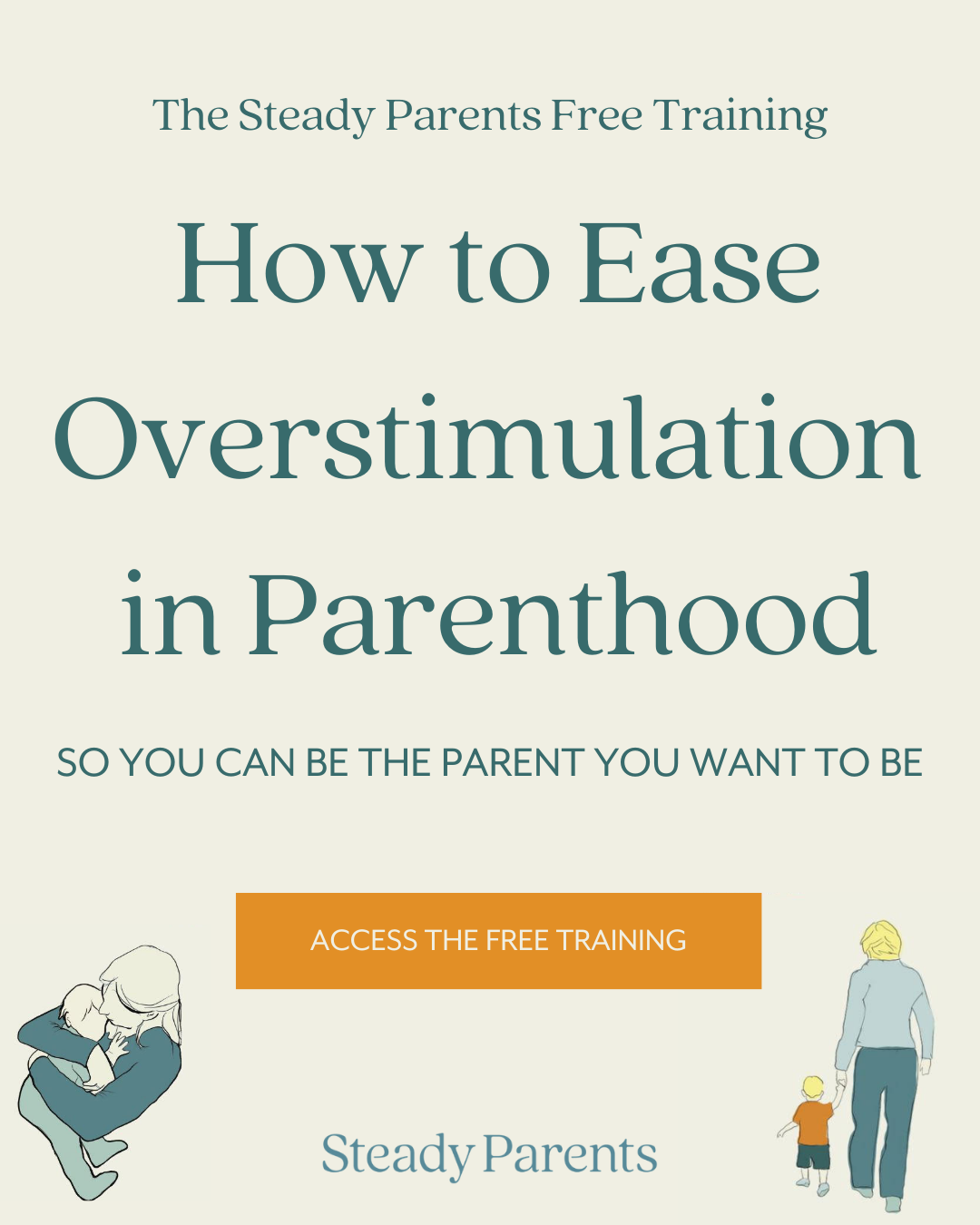How Playful Parenting Can Help Behavior, Emotional Regulation, and Sensory Processing
As an occupational therapist specializing in supporting parents through overstimulation and sensory overload, I firmly believe in the transformative power of playfulness.
Being a playful parent doesn’t necessarily mean you are constantly silly with your children and never have serious interactions with them. On the contrary, the “right” amount of playfulness will vary based on both the parent and child’s emotional needs.
To get the most out of playful interactions with your kids, the key is to be intentional with the time that you are engaging with them.
In this blog post, we'll explore how incorporating playfulness into everyday tasks can enhance parent-child connection, reduce tantrums and meltdowns, and ultimately make the parenting journey more enjoyable.
What is Parental Playfulness?
According to an article published by Early Child Development and Care, parental playfulness “describes a parent’s ability to act in a spontaneous, amusing, flexible and creative manner in different parent–child situations” (Shorer, 2019).
Parental playfulness refers to the intentional and creative approach that parents adopt to engage with their children in playful activities and interactions. It involves using humor, imagination, and spontaneity to create enjoyable and meaningful experiences that promote bonding, learning, and emotional well-being for both parents and children.
Examples of Parental Playfulness in Everyday Routines
Bedtime Routine
Transforming the bedtime routine into a playful experience can work wonders in fostering a positive association with sleep. Incorporate storytelling, gentle tickles, or a silly "monster check" under the bed to make the process engaging and fun. This not only eases bedtime resistance but also strengthens the bond between parent and child through shared laughter and imagination.
Getting Ready for the Day
Morning routines can often be hectic, but infusing playfulness can turn the chaos into moments of connection. Turn getting dressed into a race against the clock, with rewards for completing tasks on time. Use playful songs or rhymes to make brushing teeth and hair a cheerful activity rather than a chore.
Mealtime
Mealtime can be a battleground, especially with picky eaters. Embrace playfulness by creating themed meals or using creative presentations to make food more enticing. Engage in food-based games like "food art" or "tasting challenges" to encourage adventurous eating while fostering a positive and relaxed atmosphere at the dinner table.
Cleaning Up Toys
Cleaning up toys is a task that often meets resistance. Turn it into a playful game by setting a timer and challenging your child to beat the clock in tidying up. Incorporate music and dance breaks during cleanup time to make it a fun and interactive experience.
Sharing with Siblings
Sibling conflicts over sharing are common, but playfulness can diffuse tensions and promote cooperation. Use role-playing scenarios or storytelling to teach empathy and perspective-taking. Encourage cooperative play by setting up collaborative games or projects that require siblings to work together towards a common goal.
The Role of Playfulness in Parenting: Building Connection and Reducing Stress
Parental playfulness encompasses various aspects that can help build connection and reduce stress in the parent-child relationship, including:
Silliness and Humor
Parents may use silly voices, make funny faces, or engage in playful banter to create a lighthearted and joyful atmosphere during interactions with their children. Humor can diffuse tension, enhance communication, and foster a sense of connection.
Imagination and Creativity
Parents tap into their imagination to invent imaginative games, storytelling adventures, or role-playing scenarios that stimulate creativity and cognitive development in children. Encouraging imaginative play allows children to explore new ideas, problem-solving skills, and social interactions.
How many times have you pretended to be the voice of your daughter’s baby doll, asking for a bottle and nap? This type of role-playing can help prepare your child for the arrival of a new sibling or guide them toward better interactions with other babies in the future.
Flexibility and Spontaneity
Parental playfulness involves being flexible and spontaneous in adapting to children's cues and interests. It may involve going with the flow, embracing unexpected moments of playfulness, and finding joy in spontaneous activities or discoveries.
It can be frustrating when your child wants to switch tasks a million times with the game they are playing, but tuning into their natural flow of play can help ease their frustration and allow you to regulate your own emotions in the process.
Engagement and Connection
Playful interactions between parents and children strengthen emotional bonds, build trust, and promote a positive parent-child relationship. Through play, parents can engage with their children on a deeper level, fostering mutual understanding, empathy, and a sense of security.
“Parental playfulness is not limited to specific activities but encompasses a mindset and approach characterized by warmth, openness, and a willingness to connect with children through play.”
Learning and Development
Playful parenting supports children's cognitive, emotional, social, and physical development. It provides opportunities for learning, skill-building, and exploration in a fun and engaging manner, enhancing children's overall well-being and resilience.
Parental playfulness is not limited to specific activities but encompasses a mindset and approach characterized by warmth, openness, and a willingness to connect with children through play. It recognizes the importance of play in children's lives as a natural and essential way of learning, self-expression, and emotional expression.
By embracing parental playfulness, parents can create a nurturing and enriching environment that encourages curiosity, creativity, and joy in their children's everyday experiences.
While this might not always feel possible when you’re in a rush or overwhelmed with getting the house tidied up, taking a moment to pause and realize the intention of our kids is not to annoy us or get in the way, but rather to seek attention and connection from their trusted caregivers can allow you to better go with the flow.
This shift in perspective can help you from snapping at your kids the next time they ask you to play legos with them while you’re in the middle of packing their lunches for school. For more on the perspective shifts parents experience when viewing the world through a sensory lens, be sure to read my recent blog post.
In summary, when parents play with their children both sides can see tremendous benefits to their nervous systems and mental health. Let’s review them!
Advice for Parents Feeling Overwhelmed and Not Wanting to Be Playful with Their Children
Between the constant distractions of our smartphones and the heavy mental load we carry as parents, it’s not always easy to “live in the moment” with our kids. Here’s some advice I give to my clients (and that I take on myself as a parent) who frequently feels overwhelmed and touched-out.
Find Moments of Playfulness in Everyday Activities
For parents feeling low on energy or overwhelmed, seek opportunities for playful interaction in everyday tasks. Simple gestures like making funny faces during diaper changes, incorporating playful language during bath time, or engaging in a "treasure hunt" while running errands can infuse moments of joy and connection without requiring significant physical or mental energy.
Utilize Technology Mindfully
While screen time should be moderated, there are ways to leverage technology for playful interactions. Choose educational apps or interactive storytelling platforms that allow for shared engagement and meaningful conversations. Use video calls with loved ones as an opportunity for virtual playdates or collaborative games.
If you’re feeling extra distracted and depleted, put your phone on Do Not Disturb and leave it in another room for 30 minutes while you intentionally engage with your child.
Practice Self-Compassion and Prioritize Self-Care
Recognize that parenting challenges are normal, and it's okay to have moments of exhaustion or overwhelm. Practice self-compassion by acknowledging your limitations and prioritizing self-care.
Taking short breaks for deep breathing, mindfulness exercises, or engaging in activities that rejuvenate you can replenish your energy and resilience.
Seek Support and Community
Connect with other parents or join parenting support groups to share experiences, seek advice, and find solidarity. Building a supportive network can provide validation, encouragement, and new perspectives on incorporating playfulness into parenting, even during challenging times.
My community on Instagram often shares wonderful ideas for connecting with their children in the comments under my posts. Be sure to give me a follow over there!
Conclusion
Incorporating playfulness into parenting not only fosters joy and connection but also serves as a powerful tool in managing everyday challenges. By infusing moments of playfulness into tasks like bedtime routines, mealtime, and sibling interactions, parents can create a positive and nurturing environment for their children to thrive.
For those experiencing fatigue or overwhelm, embracing small acts of playfulness and practicing self-compassion can make a significant difference in navigating the parenting journey with resilience and joy.
So, let's embark on this playful journey together, finding laughter, connection, and precious moments of magic amidst the everyday chaos of parenting.
Pin this for Later:








